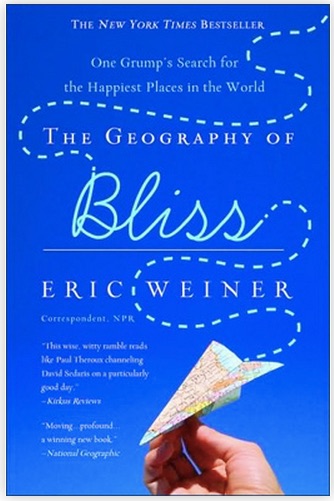I just finished reading Eric Weiner’s The Geography of Bliss, or technically the author, Eric Weiner himself, read the book to me. I’m back into audiobooks now.
I first became enamored with them a few years back when I commuted 45 minutes by foot to work. Before you start feeling badly for me, this mode of transportation was entirely by choice, and it started with a walk down Boulevard Saint-Germain, along the Seine, then up François 1er then Georges V to Étoile. Not such a bad commute, and with a minimum of 45 minutes of listening each day, I went through audiobooks pretty quickly.
The last couple of years I got out of the habit of listening to audiobooks, but I jumped back into it recently as an incentive to spend more time at the gym.
In his book, Weiner explores the question of what makes people happy–not just at the individual level, but at the societal, cultural level. Surveys have shown that populations in certain countries are happier than other populations. In fact, there’s a WDH (world database of happiness) that ranks all the countries in the world by their relative levels of happiness.
Weiner visits a number of countries with the objective of understanding, just a little bit better, what makes us happy, and conversely, what does not make us happy. He visits Switzerland, Bhutan, Iceland, India, England, Thailand, Moldova, the U.S….
I will not give you his conclusions here, to the extent he has concrete conclusions. You’ll have to read (or listen to) the book. And I do highly recommend the book. It’s easy reading/listening, entertaining yet thought-provoking. But I do want to touch upon just one of his theories as it is a theory I had been toying with recently in the context of French society, one I touched upon in a post after the Charlie Hebdo attacks. It relates to the importance of trust.
Weiner believes that in order for a population to be truly happy, they must have trust both in their government and the system and also in their neighbors. I have sensed for a while now that what often manifests as rudeness or lack of customer service in Paris is actually rooted in a feeling of mistrust of the other, of the “neighbor”. At the crux of the matter–whether it’s a store clerk who doesn’t want to let me return my item or the cleaning lady who left without cleaning because we accidentally left 10 euros too little that particular day–is that this person does not trust me. I know this phenomenon is exacerbated when a foreigner is involved (or in my case, a non-foreigner with a non-native accent, so still a foreigner). But even many of my French friends have felt it too. And it’s a feeling you do not get in every other place you may visit.
If my theory is in fact true, the question then is, “What can we do about this lack of trust?” Is it fixable? Or is it a static part of the culture? For that, I have no answers. But I would be curious to hear if any of you ever feel this mistrust in the air, and if you think there is anything we can (or should) do about it.




